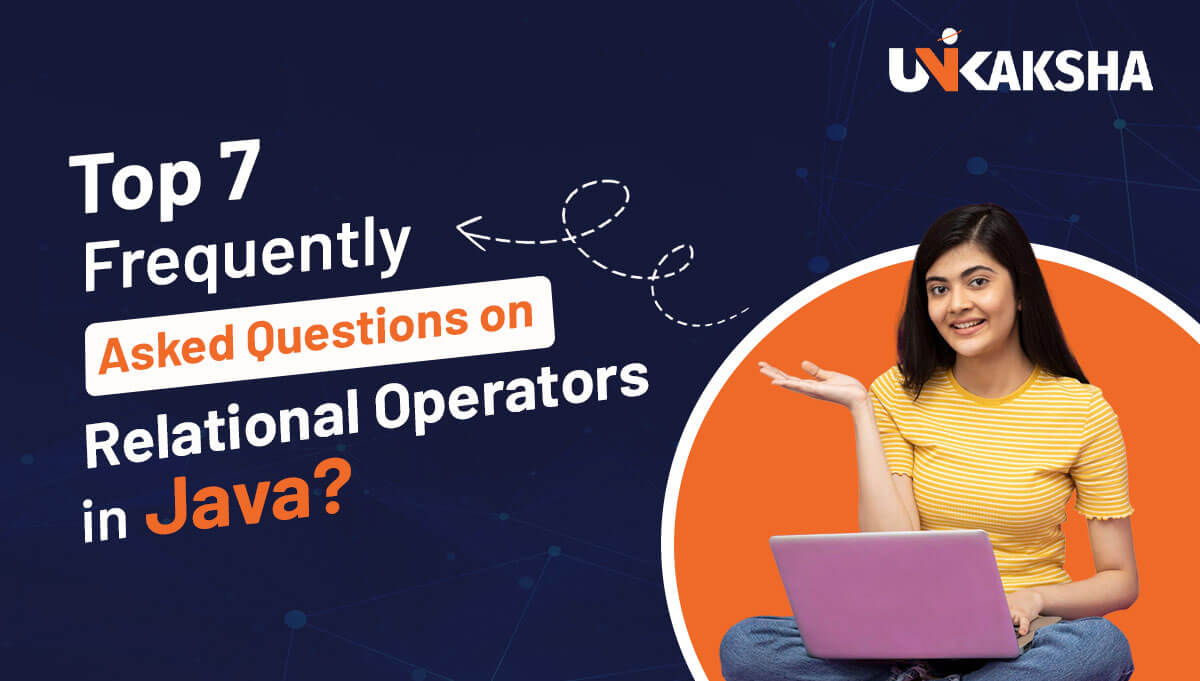Top 7 Frequently Asked Questions on Relational Operators in Java ?

We have received numerous queries from students regarding relational operators in Java. In response, we have compiled a comprehensive list of the top 7 answers to address their doubts.
So without any further ado, let’s dive in!
Here are the Top 7 Frequently Asked Questions on Relational Operators in Java:
Q: Can I use the equality operator (==) to compare two objects in Java ?
A: The equality operator (==) compares object references, not the content of the objects. It checks whether two object references point to the same memory location. If you use the equality operator to compare two objects, it will return true only if the two references point to the exact same object in memory. In most cases, when working with objects, you want to compare their content rather than their references.
To compare objects based on their content, you should use the equals() method. The equals() method is a method defined in the Object class, and all Java objects inherit this method. You can override the equals() method in your custom classes to define the comparison logic based on the content of the objects. By default, the equals() method performs a reference equality check, similar to the equality operator (==). However, many standard Java classes, such as String, already override the equals() method to compare the content of the objects.
Alternatively, if you want to perform comparisons based on a specific property or field of an object, you can consider implementing the Comparable interface in your class. The Comparable interface provides a compareTo() method that allows you to define the comparison logic for your objects. Implementing this interface enables you to use sorting and ordering operations on your objects.
Q: How do I compare two strings for equality in Java?
A: To compare two strings for equality in Java, you should use the equals() method. The equals() method is defined in the String class and is used to compare the content of two strings. Here’s an example:

In this example, the equals() method is called on the str1 string object and passed str2 as an argument. The method compares the content of the two strings and returns true because they have the same sequence of characters. If the two strings have different content, the equals() method will return false.
It’s important to note that the equals() method performs a case-sensitive comparison. If you need a case-insensitive comparison, you can use the equalsIgnoreCase() method instead.
Q: Are relational operators case-sensitive in Java ?
A: Relational operators in Java are not case-sensitive. Relational operators such as <, >, <=, and >= are used to compare values based on their inherent properties and do not consider the case sensitivity of strings. These operators work equally for both uppercase and lowercase characters.
For example:

In this example, the equalsIgnoreCase() method is used to compare the content of str1 and str2. The method ignores the case of the characters and returns true because the strings have the same content.
Q: Can I use relational operators to compare arrays in Java ?
A: Relational operators cannot be directly used to compare arrays in Java. When comparing arrays, you need to compare their individual elements. The relational operators compare values, not arrays as a whole. To compare arrays, you can use loops or utility methods like Arrays.equals().
Here’s an example of comparing arrays using the Arrays.equals() method:

In this example, the Arrays.equals() method is used to compare the content of array1 and array2. The method checks ifthe elements at corresponding positions in the arrays are equal. If all elements are equal, it returns true; otherwise, it returns false.
Q: What happens if I use relational operators with incompatible data types in Java ?
A: If you use relational operators with incompatible data types in Java, you will encounter a compilation error. Java requires compatible data types for valid comparisons using relational operators. When you use a relational operator such as <, >, <=, or >=, both operands must have compatible types.
For example, you cannot compare a string with an integer using the < operator. The following code would result in a compilation error:

To perform comparisons between incompatible types, you need to ensure that both operands are of compatible types. You might need to convert or cast the values to compatible types before using relational operators.
Q: Are relational operators limited to numeric and string comparisons in Java ?
A: No, relational operators in Java are not limited to numeric and string comparisons. Relational operators can be used with various data types, including numeric types, characters, booleans, and strings. They are not limited to specific data types and can be applied to any data type that supports comparisons.
For numeric types such as int, double, and float, the relational operators compare the numerical values. For example:

Relational operators can also be used with characters based on their Unicode values.
For example:

Relational operators work with booleans as well:

Furthermore, relational operators can be used to compare strings based on their lexicographical order:

In this example, the compareTo() method of the String class is used to compare the strings lexicographically.
Q: How can I perform complex comparisons using multiple relational operators ?
A: You can combine multiple relational operators using logical operators like AND (&&) and OR (||) to create complex comparison conditions. This allows you to construct intricate logical expressions based on multiple relational conditions.
For example, let’s say you want to check if a number x is within a specific range, such as between 10 and 20 (inclusive). You can use the logical AND operator to combine two relational conditions:

In this example, the expression x >= 10 checks if x is greater than or equal to 10, and x <= 20 checks if x is less than or equal to 20. The logical AND operator (&&) combines the two conditions, and the result is true if both conditions are satisfied.
You can also use the logical OR operator (||) to check if a value meets any of several conditions. For example:

In this case, the expression x < 0 checks if x is less than 0, and x > 10 checks ifx is greater than 10. The logical OR operator (||) combines the two conditions, and the result is true if at least one of the conditions is satisfied.
By combining multiple relational operators using logical operators, you can create complex comparison conditions to suit your specific requirements.
Related : 5 Best Front-End JavaScript Framework to Learn in 2022.
Do you want to know what are relational operators in Java in Detail? Then, see our blog post on “What Are Relational Operators in Java?” to gain a more comprehensive understanding of the concept.
About the Author
Luqmaan Shaik serves as the Blog Specialist at Unikaksha, where he leads a team of technical writers dedicated to researching and providing valuable content for blog readers. With a wealth of experience in SEO tools and technologies, his writing interests encompass a wide range of subjects, reflecting the diverse nature of the articles. During his leisure time, he indulges in an equal balance of web content and book consumption.
 Related Posts
Related Posts
|
Offerings
|
FutureFirst
|
SmartStart
|
GradEdge
|
SelfMastery
|
|---|---|---|---|---|
|
Doubt clearing session
|
                                          |
                                          |
                                          |
                                          |
|
No of job opportunities
|
15 | 25 | 15 | 3 |
|
Course Access
|
5 Years | Lifetime | Lifetime | 5 Years |
|
Free Library Courses
|
                                          |
                                          |
                                          |
                                          |
|
Job Assurance
|
                                          |
                                          |
                                          |
                                          |
|
Language
|
English/Hindi | 5 Language options | English/Hindi | English/Hindi |
|
Live classes
|
100% | 100% | 100% |                     |
|
Offline
|
                                          |
                                          |
                                          |
                    |
|
Industry Expert Sessions
|
                    |
                                          |
                    |
                    |
|
Internship (IOP)
|
                                          |
Guaranteed | Guaranteed | Based on evaluation |
|
1:1 Mentoring sessions
|
                    |
                                          |
                    |
                    |
|
Customer Support
|
                                          |
                                          |
                                          |
                                          |
|
Dedicated Program Manager
|
                    |
                                          |
                    |
                    |
|
Opt for Placement services
|
Compulsary |                                           |
                                          |
                                          |
|
Career Support
|
1 Year | 18 Months | 1 Year | 3 Months |
|
Regular assessments
|
                                          |
                                          |
                                          |
                                          |
|
Report cards
|
                                          |
                                          |
                                          |
                    |
|
Career Guidance
|
                                          |
                                          |
                                          |
                    |
|
Certificates
|
                                          |
                                          |
                                          |
                    |
|
Scholarship
|
                                          |
Available | Available |                     |
|
Trial Class
|
1 week | 1 week | 1 week |                     |
|
Outside placement
|
Paid | Allowed | Allowed | Allowed |
|
Premium Jobs
|
                    |
                                          |
                    |
                    |
